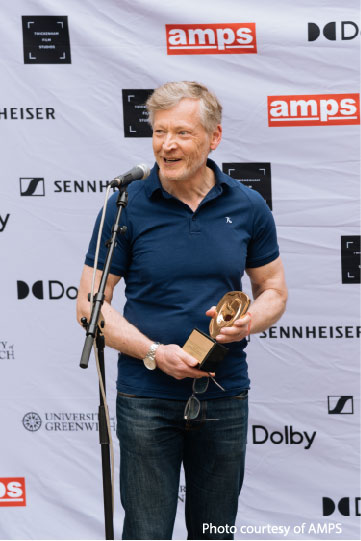Last month, the Association of Motion Picture Sound (AMPS) 2021 Awards took place and among the winners was George Foulgham, who was on the sound team that was awarded the ‘Excellence in Sound’ for Factual Film Ronnie’s: Ronnie Scott and his World-Famous Jazz Club. After the awards George kindly agreed to an interview with us to discuss his new company, latest award win and mixing philosophies.
George is an acclaimed Sound Re-Recording Mixer and Supervising Sound Editor whose work spans across television and film. His latest award from AMPS sits proudly alongside a BAFTA for his work on Trawlermen in 2010. He has also been nominated by BAFTA six times and his work has been highlighted as important to the success of the Oscar-winning feature documentary Man On Wire.
When we sat down with George, one of our first topics was the recent launch of his company George Foulgham Soundscapes. In March of this year, George started his own boutique audio post-production company with a focus on providing support for film & tv productions, both documentary and drama. When asked if it was counterintuitive to begin a business amidst lockdowns and the pandemic, George explained how in many ways the pandemic has helped change previous assumptions about audio post-production.
“The interesting part about launching during the pandemic has been the shift of clients’ perspectives and availability,” says George. “They have become much more available to discuss their projects, and are more trusting of remote work. This became a necessity for creatives during the pandemic, and now clients are quite happy about it, they’re not worried by that concept anymore.”
Technology has also come a long way. “Nowadays, devices like the Avid S1 along with the power of Pro Tools make working from home possible and professional. I can do the majority of my pre-mixing in my own studio, then work on the final mix in a large theatre. The speed at which files can be shared now also makes remote work completely doable.”
Another aspect of GF Soundscapes is George’s desire to be involved in productions from concept to the final mix. “When I’m involved with a film or programme from the start, I can talk to the editors and directors and get a feeling for the job. You can talk about which composers they want to use and get much more insight and creative detail about the project. Previously I would simply have been informed that I’d be on a project in two weeks time with not much detail on the production. To counter this way of working, I wanted to go back to the basics again – it is nice to have a longer process to help build creative ideas together and make for a better final outcome”.
Finally, when we got to chatting about Ronnie’s, George shared a key belief he has around mixing. Dialogue comes first, which is an interesting idea considering his latest win comes from a documentary feature focused on jazz music. George had this to say about it, “For any story, whether it be for a documentary or a drama, the audience needs to hear the dialogue so they can understand what is going on. For documentaries, the clarity and the importance of dialogue is king because that is what the story hangs on.”
“When I was mixing Ronnie’s, for example, there is a lot of music in it, and I had to try out various ways of mixing music around the dialogue to make it as clear as possible. It isn’t always the easiest to balance the power of music against dialogue. You have to allow the music to wrap itself around the dialogue.” We ended the interview on this final note from George. “Dialogue comes first is a sort of mantra that was passed on to me when I was an assistant, and it is something I will now pass on to those who assist me.”
To learn more about George or George Foulgham Soundscapes go to GFsoundscapes.com



